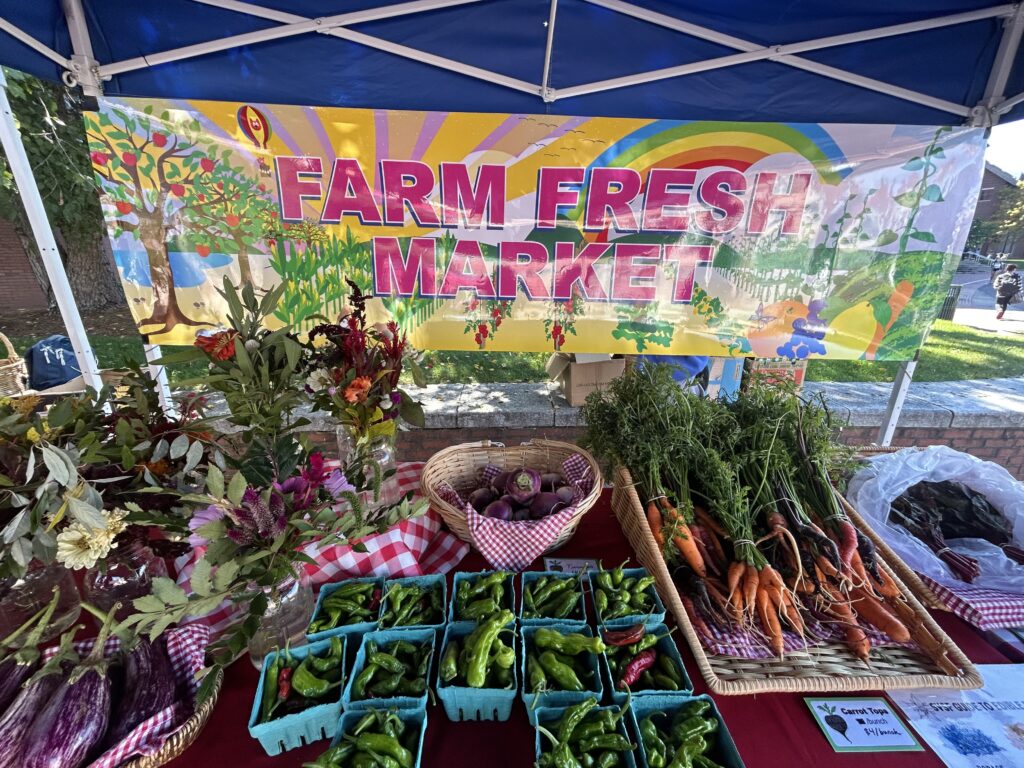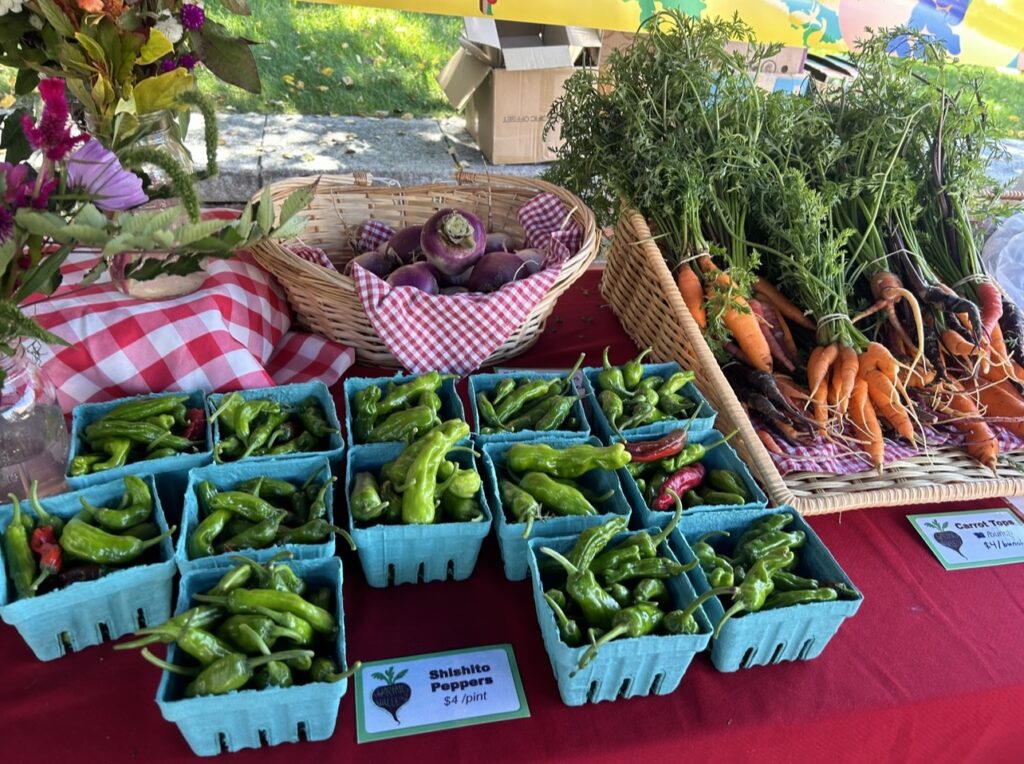Tabitha Baker

With weather in Connecticut constantly being so unpredictable, there is no question that farmers in the state are feeling the affects. Torrential rains, severe droughts, and extreme heat, there is the constant concern that crops may not do well for the season.
Today, I interviewed Jessica Larkin-Wells — a University of Connecticut student to devotes her time to maintaining Spring Valley Farm in Storrs, CT. Students at UConn have been feeling the affects of the drastic changes in weather — but what has the farm been experiencing? Take a listen and find out how Climate Change is affecting the outcome of crops — not only making food go bad, but also changing the practices of farmers like Larkin-Wells in the state.
Tabitha Baker:
With so many drastic changes in weather this season, there’s no question that farmers have suffered the consequences. I talked to Jessica Larkin-Wells, UConn Student who works at Spring Valley Farm in Storrs, Connecticut, to learn more about how exactly farms have been affected by these fluctuating climates, ultimately caused by climate change.
Tabitha Baker:
This summer there was so much rain, I know there was so much rain just recently too, too. And then there was, like, the drought at one point. There was so much heat. So have you noticed any sort of changes in how the produce was, I guess how you harvested the produce, what it looked like it was different?
Jessica Larkin-Wells:
Yeah, absolutely. • • Um, • • • • we’re really lucky to be a farm that’s not within floodplains, • so we didn’t face flooding at all on our farm. We didn’t see standing water a single time all summer, except for right in our driveway where the soil is really compacted. • • Um, so that speaks to the health of our soil in terms of having really good drainage and water absorption.
Tabitha Baker:
Okay,
Jessica Larkin-Wells:
But it also speaks to us just being high enough above the water table that we didn’t have to deal with that. Um, so instead, we just sort of faced the impacts of things staying damp • • • • • • just all summer. Uh, • • • so • • what that ended up looking like for us • • • • • • • • • is just like us, like, way more fungal disease. • • • • • • • • • • • • • • Fungal disease is just really happy in those warm, humid conditions because it wasn’t just that it was • • so damp and things didn’t get a chance to dry out between rain events, but that the night stayed warm for a lot of the summer. And so that’s just, like, • • awesome for whatever different fungal pathogens we had going on. • Um, and then the other thing was aphids. And it’s just cool to compare to last summer when • • • • • • • • • there was not a single aphid on the farm.
Tabitha Baker:
I’m sorry, what is an aphid?
Jessica Larkin-Wells:
They’re just like little bugs.
Tabitha Baker:
Okay, sorry I don’t really know much about farming.
Jessica Larkin-Wells:
No no it’s okay.
Tabitha Baker:
Cool. • • • So what plants specifically? Is there anything here that you’ve just or I guess maybe you probably wouldn’t have it here that was really affected the most that you noticed?
Jessica Larkin-Wells:
Um, • • well, our nasturtiums were just knocked out by the aphids. Those are edible flowers, so we grow them more as a companion plant than as an actual crop.
Tabitha Baker:
Okay.
Jessica Larkin-Wells:
Some diseases on the carrots, actually, • • • the tomatoes is probably the biggest. •

Tabitha Baker:
Okay.
Jessica Larkin-Wells:
Yeah, • • • • our larger tomatoes, we just took those out last week or early this week. • •
Tabitha Baker:
Yeah, I understand. There was like, um, • • I think it was called because I visited Cobblestone Farm in Mansfield also, and they said that.
Jessica Larkin-Wells:
They experienced she’s always willing to talk to people, Diane.
Tabitha Baker:
Yeah, she’s cool. But, um, she was talking about how there was a May freeze. I think that affected a bunch of farms, I believe.
Jessica Larkin-Wells:
Right, yeah. So that was just a really late freeze. Um, • • it has the biggest impact on fruit growers, like anybody with orchard trees, because it just killed off the buds • • • • • • • just as they became susceptible to frost. You kind of thought frost was over. Um, yeah. So that was • • really huge for fruit growers. It didn’t really impact us. We were • • prepared for that well enough. We also typically have really late frost where we are. We’re like in the valley, so all the cold air just sort of rolls down the hill. So, uh, we expect late frost, so we sort of plan for that.
Tabitha Baker:
Okay. Is that kind of like what you did? I know you said you were kind of like elevated, right?
Jessica Larkin-Wells:
So you avoided the • • • • we’re like, midway down the valley. We’re like big hill with cows. We’re in the, right here in a little flat spot. And then the river is down here. But the river never got high enough to bother us.
Tabitha Baker:
Yeah. So the rain would just flow instead of just stopping at, ah, the farm, it would just go past, which is lucky for you guys, • • • I guess. You didn’t really prepare anything, like, to prevent, uh, the rain from harming the plants or you just happened to be in the middle and not affected. • • • • • •
Jessica Larkin-Wells:
You can’t expect it. • • Um, • • • • • • • • • • • • • some things that we do on a wet year are minimize row cover, • • • • which is like, typically a great technique for keeping pests off of plants and extending the season and whatnot. • • • • • • But because we really wanted to have good air circulation, we sort of minimized that and then tried to have plants spaced a little bit further apart. But it was hard to predict because it really wasn’t that wet early • • • the spring. M was dry.
Tabitha Baker:
Mhm.
Jessica Larkin-Wells:
We did last year • • • • and then it ended up just being so rainy
Tabitha Baker:
yeah.
Jessica Larkin-Wells
That we didn’t end up needing it.
Tabitha Baker:
Yeah.
Tabitha Baker
I guess it’s just unpredictable, to be honest. That’s what a bunch of these farms are experiencing also. • • • • • • • • • It’s just been so crazy. • • • • Would you say that this weather has affected the crops the most out of any of the other years that you’ve.
Jessica Larkin-Wells
No, last year was worse for us.
Tabitha Baker:
Really?
Jessica Larkin-Wells:
Yeah.
Tabitha Baker:
What happened?
Jessica Larkin-Wells:
It was just a drought. Yeah. Uh, I believe I forget what the stats were exactly on this, but if you look at July rainfall for this year versus last year, last year it was less than one inch, and this year it was like 13 or 14 inches.
Tabitha Baker:
Wow. That’s nuts.
Jessica Larkin-Wells:
Um, so, yeah, just a huge swing. And the drought was more challenging for us. Um, it was also challenging because the pest pressure was just way higher last year in terms of rabbits and. • • • • • • •
Tabitha Baker:
Mhm. • • • • • • • • • • • • So you guys sell all this stuff, right? So where does the money go that.
Jessica Larkin-Wells:
You when you sell • • • part of? So Spring Valley Student Farm is a part of dining services, • • um, which is unusual for University Farm to be actually operated by the dining department of the university. Yeah.
Tabitha Baker:
I never heard of it. That’s so cool.
Jessica Larkin-Wells:
Yeah. Um, • • • so dining • • • pays me, buys all of our supplies and equipment, • • um, like pays student employees during the summer • • • • and so dining doesn’t buy the produce because we’re already part of dining. • • • So • • • whatever money we make at market just goes into dining and then whatever produce we have left over at the end of market, we’ll just bring typically we bring it to Whitney first and if we have more than they can take, then we’ll bring it to another dining. • • • • • • • • • • • • • • • • • • • • • Um, just to be clear on that, dining is not making a profit off of a farm.
Tabitha Baker:
Understood.
Jessica Larkin-Wells:
It is a huge investment for them to be funding an educational • • • • uh.
Tabitha Baker:
I know. It’s like the profit I guess • • • • it doesn’t really affect Yukon too much, but have you noticed you’ve been making less money because of the lack of are you been really experiencing a lack of produce because of this weather or no, some of it is.
Jessica Larkin-Wells:
We aren’t
Tabitha Baker:
Okay, well that’s good —
Jessica Larkin-Wells:
Um, definitely • • • it’s getting worse as the season goes on.And I kind of feel like we’re just sliding out of the way of it and if we had more fall crops in, they would be suffering. • • • Um, • but no, the season has honestly been pretty good for us. I’m curious to see m, what the impact will be next year because the issue with for example, you may have noticed how all the sugar maples, like a lot of the trees have just dropped their leaves. Like they just turn brown and dropped. Whereas sugar m maples typically will turn like a beautiful golden color • • and they’ll steadily will stay on the trees for a while. So that happened because of anthraxnose, • • • • • • but a fungal disease that affected the trees. And so • • we use leaves to molt the farm and anthrax over winters in • • • • • whatever dead matter of plants that have been infected. So it’ll be interesting to see if we have way higher fungal pressure early next season. • • • • • • • And the fungus that comes onto the trees or whatever, plant that’s from the water. The rain. The excessive rain.Yeah. Same situation where it’s just like not being able to dry out for long enough and having really warm nights. Okay, so just like a warm, moist environment. • • • • Not good. Seen • • plenty of people have had Mormon mold in their basements or whatever. • • • • • • •
Tabitha Baker:
And the dorms. Yes. • • • • • • No, but that’s interesting. But this is really cool. Like the setup and everything. I always walk by, accept classes all day on Thursdays, but yeah, this is really cool.
HYPERLINKS
For CT farmers, changes in the climate, and in the agriculture industry, pose new challenges